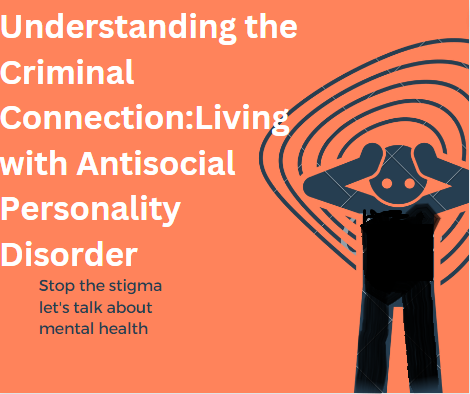Antisocial personality disorder (ASPD) is a mental health condition characterized by persistent disregard for the rights of others and violation of social norms.
People with this disorder often engage in deceptive, manipulative, and exploitative behaviors. They may regret their actions and have difficulty forming and maintaining important relationships.
Key features of criminal personality disorders include:
Lack of empathy: People with ASPD may also have difficulty perceiving and considering the feelings and reports of others. They often show indifference to the impact of their actions on others.
Impulsivity: There may be a tendency to act on impulses in addition to considering ability consequences. This can lead to erratic behavior, including substance abuse, reckless use, or criminal activity.
Irritability and aggression: People with ASPD may also have short tempers and engage in physical or verbal arguments. They will have a record of interpersonal conflicts.
Deception: People with ASPD often lie and manipulate others for non-public gain. They may be adept at providing a false image or spinning complicated stories to achieve their dreams.
Irresponsible behavior: Frequent failure to meet painting or financial obligations. This will involve a disregard for one’s own or the well-being of others.
Loss of remorse: People with ASPD may also show little remorse for the harm they have caused to others. They should rationalize their behavior or blame others for their behavior.
It is important to realize that a diagnosis of criminal personality disorder is usually made in maturity, however, symptoms of a conduct disorder (a group of similar behaviors) may appear earlier and earlier in life. The exact cause of ASPD is not fully understood, however, a combination of genetic, environmental, and neurological factors may contribute to its development.
It is also important to recognize that not everyone with behavioral problems or criminal tendencies has a personality disorder and requires an appropriate prognosis based on a complete evaluation by a certified intellectual health professional. Treatment for ASPD can be challenging because people with the disorder may not be motivated to change. However, an active treatment process may help address specific signs, symptoms, and behaviors. Read more
Causes of Antisocial Personality Disorder in Adults
The causes of adult criminal personality disorders (ASPD) are complex and multifactorial, often related to genetic, organic, environmental, and psychiatric factors. It is important to note that not everyone with risk factors for ASPD will develop the disease; rather, the interaction of many factors contributes to its development. Some potential causes and opportunity factors include:
Genetic factors: There is evidence of a genetic predisposition to antisocial behavior. Individuals with criminal traits or a family history of personality disorders may be at greater risk.
Organic factors: Neurobiological factors, as well as abnormalities in brain shape and characteristics, neurotransmitter imbalances (e.g., serotonin), and impaired frontal lobe function, have been linked to antisocial behavior.
Early Adolescence: Disruptive development throughout early childhood, including amnesia, physical or emotional abuse, and inconsistent parenting, may contribute to the development of ASPD. The loss of a solid nurturing environment may also impact the development of empathy and moral reasoning.
Environmental factors: Exposure to high-threat or antisocial environments, including growing up in a neighborhood with disproportionately high crime rates or having a group of relatives and participants who follow con artists’ activities, may increase the chance of developing criminal traits.
Psychological factors: At some point during development, positive personality tendencies and behaviors, including behavioral disorders, aggression, and impulsivity, may also precede improvement in adverse personality disorders.
Temperament factors: People with temperaments that are excessively sensation-seeking, have a low fear of punishment, and lack responsiveness to social cues may be particularly susceptible to antisocial behavior.
Parental influences: Inconsistent areas, loss of positive functioning models, and parental rejection may contribute to ameliorating antisocial tendencies in infants, which may also persist into adulthood.
Substance Abuse: Substance abuse, especially while growing up, may increase the chance of criminal behavior. Drug use may also exacerbate current criminal tendencies or lead to impulsive and reckless behavior.
It is important to observe that these factors often interact, and the exact cause of antisocial personality disorder may vary from one personality to another. Additionally, diagnosis of ASPD is often not made until adulthood, but early symptoms and risk factors may be apparent in childhood and early life.
Early intervention and an appropriate treatment process can be crucial in managing and mitigating the impact of offending behaviour. For a complete assessment and development of an appropriate remediation plan, the assistance of an intellectual health professional is required.
Treatment options for high-functioning antisocial personality disorder
Treating hyperfunctional antisocial personality disorder (ASPD) can be difficult because people with the disorder often lack motivation to deal and do not view their behavior as problematic. The effectiveness of treatment varies from person to person, so it is critical to tailor interventions to address precise signs, symptoms, and behaviors. Here are some potential treatment preferences for hyperfunctional antisocial personality disorder:
Psychotherapy:
Cognitive behavioral therapy (CBT): CBT can help ASPD patients identify and change distorted thinking patterns and behaviors. It can focus on improving impulse control, anger management and developing empathy.
Dialectical Behavioral Therapy (DBT): DBT is a form of therapy that combines cognitive behavioral techniques with mindfulness techniques. It can help individuals manage excessive emotions and improve relationships.
Medicinal drugs:
Also, because there are no specific medications designed specifically for ASPD, certain medications may be prescribed to address co-occurring symptoms or conditions. For example, if there is comorbid depression or nervousness, mood stabilizers or antidepressant medications may be used.
Group therapy:
Tissue therapy can offer patients with ASPD the possibility to interact with others and learn social skills. It also serves as a platform for practicing and perfecting prosocial behaviors.
Anger Control Application:
Because people with ASPD may also struggle with impulsivity and aggression, working together in an anger management program may be helpful. These classes train the ability to recognize and deal with anger in a constructive manner.
Social skills training:
Instruction and practice in appropriate social skills can help people with ASPD interact socially more effectively. This will include learning a way to respond to social cues and build healthier relationships.
Family Circle Therapy:
If family dynamics influence or are affected by an individual’s behavior, then your own family therapy may be valuable. It can help improve speech communication and resolve potential kinship issues.
Legal Outcomes and Oversight:
In some cases, jail consequences may be part of the treatment process. Supervision and monitoring, including probation or parole, may be conducted to ensure compliance with criminal requirements.
It is worth mentioning that treatment of hyperfunctional ASPD is often more successful when there is motivation for voluntary participation and alternatives. However, many people with the disorder do not voluntarily seek treatment, and crime or external pressure may be the primary motivator.
Involvement of intellectual health professionals, as well as psychologists, psychiatrists, and counselors, is critical in developing a comprehensive treatment design. It is also necessary for relatives and loved ones to be involved in therapeutic techniques to provide assistance and improve quality. Of note, the prognosis of hyperfunctional ASPD is alarming, and long-term cycle control techniques are often necessary.
Antisocial personality disorder and criminal behavior
Antisocial Personality Disorder (ASPD) is often associated with deceptive behavior because people with the disorder may also persistently violate the rights of others and disregard social norms.
It is important to note that it is no longer the case that everyone with ASPD commits crime; criminal behavior is simply one manifestation of a broader pattern of antisocial development. However, the link between adverse personality disorders and crime is well established, and a number of factors contribute to this link:
Impulsivity and lack of inhibition:
People with ASPD often exhibit impulsive behavior and loss of inhibition. In addition to fully considering the consequences, this may also lead to engaging in scammer activity.
Aggression and violence:
Aggressive and violent behavior is not uncommon among people with antisocial personality disorder. This type of aggressive behavior can manifest itself in a variety of bureaucracies, including physical altercations, domestic violence, or other acts of fraud.
Deception and manipulation:
People with ASPD are often good at deceiving and manipulating. This will facilitate involvement in fraudulent sports, scams or different types of white collar crime.
Lack of empathy:
An awe-inspiring characteristic of ASPD is a loss of empathy for the emotions and rights of others. This loss of empathy may make people with the disorder more likely to engage in wrongdoing in addition to regretting it.
Reckless and adventurous:
Recklessness and an excessive tolerance for threats are common characteristics of people with criminal personality disorders. This can lead to involvement in criminal groups or dangerous movements.
Substance Abuse:
Co-abuse of drugs is not uncommon for people with ASPD. Substance abuse can lower inhibitions and encourage criminal behavior, as well as selling or stealing drugs to support addiction.
Failure to comply with social norms:
Diagnostic criteria for ASPD include a persistent sample of behavior that involves violations of social norms and the rights of others. Carrying out fraudulent conduct is a clear demonstration of this standard.
It is important to recognize that not all people with antisocial personality disorder will eventually become involved in criminal activity. In addition, a combination of genetic, environmental, and situational factors may also stimulate criminal behavior. It is not uncommon for people with ASPD to be incarcerated and involved in criminal justice facilities, and some may spend much of their lives in and out of correctional facilities.
Addressing cheating behavior associated with antisocial personality disorder often requires a comprehensive suite of techniques, including criminal intervention, intellectual health remedies, and social assistance. Treatment may also involve recognizing dealing with impulses, improving empathy, and addressing underlying issues that lead to criminal behavior.


.png)
.png)
.png)



